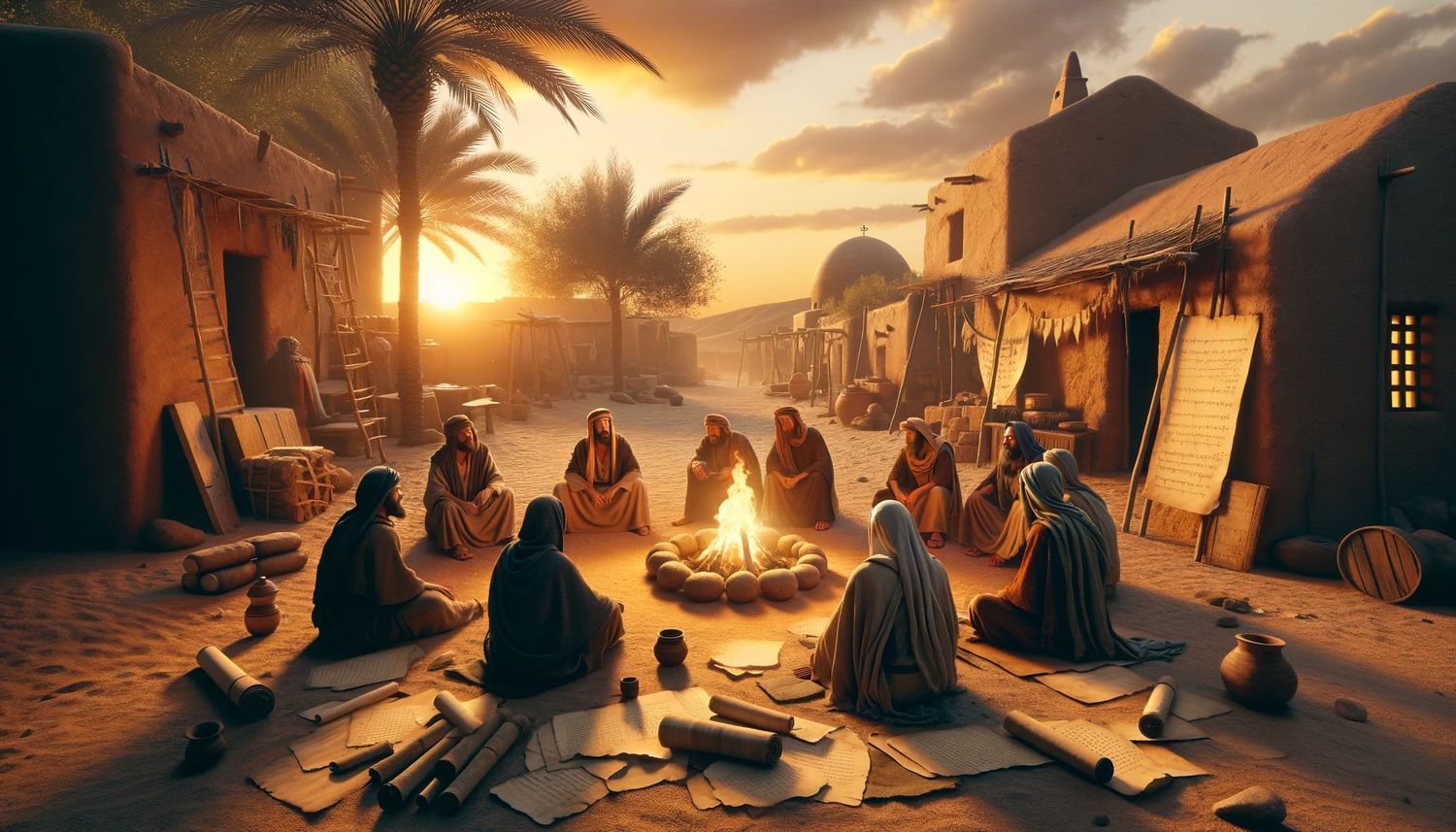Home>Christian Videos>Bible Stories>When Were Gnostic Gospels Written


Bible Stories
When Were Gnostic Gospels Written
Published: March 6, 2024
Peter Smith, Editorial Director at Christian.net, combines deep insights into faith, politics, and culture to lead content creation that resonates widely. Awarded for his contributions to religious discourse, he previously headed a major organization for religious communicators, enhancing dialogue on faith's societal impacts.
Discover the origins of Gnostic Gospels and their significance in biblical stories. Uncover the timeline of when these texts were written and their impact on early Christianity.
(Many of the links in this article redirect to a specific reviewed product. Your purchase of these products through affiliate links helps to generate commission for Christian.net, at no extra cost. Learn more)
Table of Contents
Introduction
When were Gnostic Gospels written? This question has intrigued scholars and religious enthusiasts for centuries. The Gnostic Gospels are a collection of early Christian texts that were not included in the New Testament. These texts offer a different perspective on the life and teachings of Jesus Christ, and they have sparked intense debate about their origins and significance. In this article, we will delve into the origins of the Gnostic Gospels, explore the dating of these texts, and discuss their significance in the context of early Christianity.
Read more: When Were The Gospels Written?
The Origins of Gnostic Gospels
The Gnostic Gospels are attributed to a group of early Christian sects known as the Gnostics. These texts were discovered in the mid-20th century in Egypt, and they shed light on the diverse beliefs and practices within early Christianity. The Gnostics were proponents of a mystical form of Christianity that emphasized the acquisition of secret knowledge (gnosis) as a means of salvation. They believed that this knowledge was imparted to them by Jesus Christ himself, and it differed from the teachings found in the canonical New Testament. The Gnostic Gospels reflect a spiritual tradition that sought to transcend the material world and attain a deeper understanding of the divine realm. The origins of these texts are rooted in the theological and philosophical milieu of the early Christian era, where diverse interpretations of Jesus' teachings flourished.
The Gnostic Gospels also draw upon a variety of sources, including Jewish mysticism, Greek philosophy, and other religious traditions of the time. These texts incorporate elements of dualism, the belief in the existence of opposing spiritual and material realms, as well as the concept of a divine spark within each individual that yearns to return to its heavenly origin. The diverse origins of the Gnostic Gospels reflect the rich tapestry of religious thought in the ancient world and provide valuable insights into the development of early Christian theology.
The discovery of the Nag Hammadi library in 1945, which contained many of the Gnostic Gospels, was a watershed moment in the study of early Christianity. These texts had been largely lost to history, and their recovery provided scholars with a new window into the diversity of beliefs and practices within the early Christian movement. The origins of the Gnostic Gospels are thus intimately tied to the complex tapestry of early Christian history, shedding light on the dynamic and multifaceted nature of the faith in its formative years.
The Dating of Gnostic Gospels
-
Early Origins: The dating of the Gnostic Gospels is a complex and contentious issue. Scholars have employed various methods to determine the age of these texts, including linguistic analysis, historical context, and carbon dating of the materials. The Gnostic Gospels are believed to have been composed between the 2nd and 4th centuries CE, making them roughly contemporaneous with the canonical New Testament. However, some of these texts may contain earlier oral traditions that date back to the 1st century CE, providing a glimpse into the diverse expressions of Christianity in its earliest stages.
-
Linguistic and Historical Context: Linguistic and historical analysis of the Gnostic Gospels has provided valuable insights into their dating. These texts exhibit a linguistic style that reflects the cultural and intellectual milieu of the Greco-Roman world, suggesting that they were composed during a time of vibrant intellectual exchange. Furthermore, the historical context in which the Gnostic Gospels emerged, marked by theological diversity and doctrinal debates within early Christianity, informs their dating and sheds light on the theological currents that shaped these texts.
-
Carbon Dating and Material Analysis: The physical materials on which the Gnostic Gospels were written have also been subjected to scientific analysis to determine their age. Carbon dating and material analysis have provided valuable data regarding the dating of these texts, offering a more precise understanding of their chronological placement within the early Christian era. These scientific methods have contributed to the scholarly consensus regarding the dating of the Gnostic Gospels, although ongoing research and discoveries continue to refine our understanding of their origins.
-
Diversity of Dating: It is important to note that the dating of specific Gnostic Gospels may vary, as these texts were composed over a span of several centuries and in diverse geographical locations. The dating of individual Gnostic Gospels is thus a nuanced endeavor that takes into account the unique historical, linguistic, and theological characteristics of each text. This diversity of dating underscores the complex and multifaceted nature of the Gnostic Gospels and their significance in the broader context of early Christian literature.
-
Continued Scholarship: The dating of the Gnostic Gospels remains an area of active scholarly inquiry, as new discoveries and interpretive methods continue to shape our understanding of these texts. Ongoing research in fields such as archaeology, linguistics, and textual analysis holds the promise of further illuminating the dating and origins of the Gnostic Gospels, enriching our comprehension of the diverse religious landscape of early Christianity.
The Significance of Gnostic Gospels
-
Diverse Theological Perspectives: The Gnostic Gospels offer a diverse array of theological perspectives that expand our understanding of early Christian thought. These texts present alternative interpretations of Jesus' teachings, the nature of divinity, and the human condition, providing valuable insights into the theological diversity of the early Christian movement.
-
Spiritual and Mystical Emphasis: The Gnostic Gospels emphasize the spiritual and mystical dimensions of Christianity, highlighting the pursuit of inner knowledge and the quest for spiritual enlightenment. This mystical orientation offers a unique lens through which to explore the spiritual aspirations and practices of early Christian communities.
-
Challenges to Orthodoxy: The Gnostic Gospels challenge traditional orthodox Christian beliefs, prompting scholars and religious thinkers to reevaluate the boundaries of early Christian orthodoxy. The existence of these alternative perspectives invites critical reflection on the formation of the New Testament canon and the diversity of beliefs within early Christianity.
-
Ethical and Moral Reflection: The ethical and moral teachings found in the Gnostic Gospels provide valuable insights into the ethical concerns and moral frameworks of early Christian communities. These texts offer a nuanced understanding of the ethical challenges faced by early Christians and the diverse ways in which they sought to navigate moral dilemmas.
-
Gender and Social Dynamics: The Gnostic Gospels also shed light on gender dynamics and social structures within early Christian communities. These texts present alternative portrayals of women and gender relations, offering a more complex and multifaceted view of the social landscape of early Christianity.
-
Interfaith Dialogue: The Gnostic Gospels engage with a wide range of religious and philosophical traditions, fostering interfaith dialogue and enriching our understanding of the diverse religious currents of the ancient world. These texts provide a platform for exploring the intersections between Christianity, Judaism, Hellenistic philosophy, and other religious traditions of the time.
-
Contemporary Relevance: The Gnostic Gospels continue to inspire contemporary spiritual seekers and scholars, sparking discussions about the relevance of their teachings in the modern world. Their emphasis on inner spiritual transformation, the pursuit of knowledge, and the quest for divine wisdom resonates with individuals seeking a deeper understanding of spirituality and the human experience.
-
Historical and Cultural Context: The Gnostic Gospels offer valuable insights into the historical and cultural context of early Christianity, enriching our understanding of the religious, philosophical, and social dynamics of the ancient world. These texts provide a window into the vibrant tapestry of religious thought and practice in the formative years of the Christian tradition.
-
Continued Scholarly Inquiry: The significance of the Gnostic Gospels lies not only in their historical and theological value but also in their capacity to inspire continued scholarly inquiry and dialogue. These texts invite ongoing exploration and interpretation, contributing to the dynamic and evolving field of early Christian studies.
-
Pluralism and Diversity: Ultimately, the significance of the Gnostic Gospels lies in their embodiment of pluralism and diversity within early Christianity. These texts challenge us to embrace the multifaceted nature of the Christian tradition and to engage with its diverse expressions, fostering a more inclusive and expansive understanding of the religious heritage of humanity.
Conclusion
In conclusion, the dating of the Gnostic Gospels is a complex and multifaceted endeavor that encompasses linguistic, historical, and scientific analysis. These texts offer valuable insights into the diverse theological, spiritual, and ethical dimensions of early Christianity, challenging traditional orthodox beliefs and enriching our understanding of the religious landscape of the ancient world. The significance of the Gnostic Gospels lies in their capacity to inspire ongoing scholarly inquiry, foster interfaith dialogue, and promote a more inclusive and diverse understanding of the Christian tradition. As we continue to explore the origins and significance of the Gnostic Gospels, we are reminded of the rich tapestry of religious thought that has shaped the human experience, inviting us to engage with the diverse expressions of spirituality and wisdom that have permeated the history of humanity.















